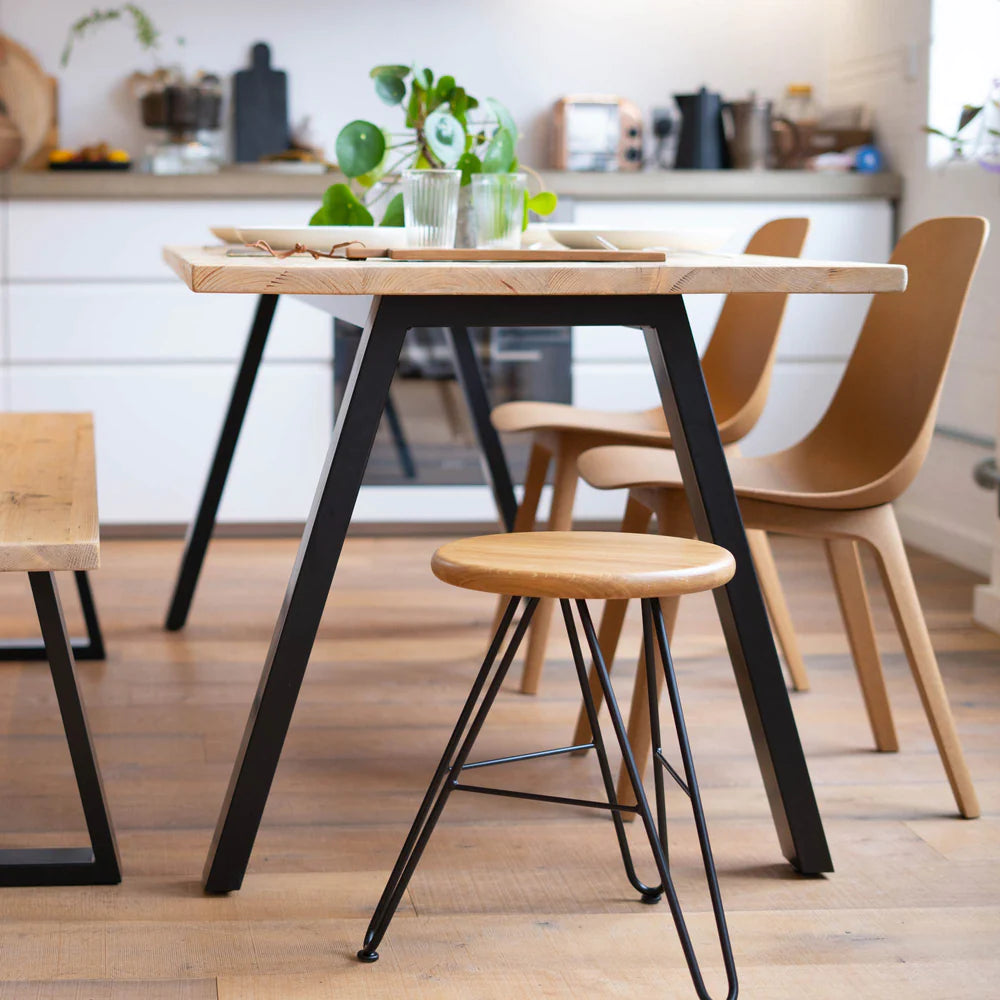Expert Tips for Putting Up Eating Space Table Legs for Optimum Stability
When it involves installing eating area table legs, achieving optimum stability is paramount for both capability and aesthetics. The procedure begins with choosing the ideal materials and hardware, adhered to by meticulous alignment and consideration of weight distribution. Each action plays a critical role in making certain that the finished item holds up against everyday usage without compromising safety or layout stability. Comprehending the subtleties of these components can dramatically affect the overall outcome. What details techniques can improve stability also additionally?
Choose the Right Legs
When choosing the appropriate legs for your dining-room table, it is important to consider both performance and looks. The legs you select will significantly affect the overall design and security of the table. Initially, review the table's planned usage; if you expect frequent celebrations, sturdier legs, such as those made from strong timber or steel, may be preferable, as they use boosted durability and support.
Basic eating tables usually range from 28 to 30 inches in height, so ensure the legs line up with this requirement for comfort. Conical legs can add a modern touch, while transformed legs may convey an extra classic aesthetic.

Select Appropriate Equipment
How can the best hardware improve the stability and longevity of your dining-room table? The selection of appropriate hardware is critical to making certain that the legs of your table are securely affixed and able to withstand regular use. Premium screws, bolts, and brackets provide the required stamina to sustain the weight of the table, along with any type of additional tons placed upon it during celebrations or meals.
When selecting screws, select those made from resilient products such as stainless steel or brass, which withstand deterioration and preserve integrity gradually. The size of the screws is similarly vital; they need to pass through deeply into the table's framework without jeopardizing stability. For bolted connections, consider making use of lock washers to avoid loosening up because of resonance or motion.
Additionally, making use of edge brackets can add added assistance, especially for larger tables or those with much heavier tops. These braces distribute weight equally and help maintain the table's form. Ensuring that the equipment you pick is suitable for the details materials of your table will further boost its overall stability and long life, enabling you to enjoy your dining experience for years to find.
Ensure Proper Placement
Proper placement of eating area table legs is essential for both aesthetic charm and functional security. Misaligned legs can cause an unequal tabletop, which might not only be visually uninviting however also jeopardize the table's usability. To accomplish optimal alignment, start by gauging the distance from the table's corners to the leg add-on points. This guarantees that each leg is positioned equidistant from the edges, creating a balanced appearance.
Make use of a level throughout setup to confirm that each leg is vertical to the tabletop. This step is important, as also small Go Here disparities can rise right into substantial stability concerns over time. It is a good idea to note the wanted leg settings on the bottom of the table with a pencil or covering up tape before safeguarding them. This practice offers as an aesthetic overview, permitting changes as required.
Furthermore, ascertain the alignment after the initial screws are tightened, as adjustments may be needed before totally protecting the equipment. By prioritizing proper alignment, you not just enhance the table's general style however additionally make sure that it remains steady and useful for several years ahead.

Take Into Consideration Weight Circulation
After making sure correct placement of the dining-room table legs, it's vital to take into consideration weight circulation to improve security and performance. dining room table legs. Appropriate weight circulation is crucial in avoiding tottering and Our site making certain that the table can sustain its designated load without risk of tipping or breaking down
When placing the my website legs, guarantee they are put at equal ranges from the facility of the table to equally disperse the weight throughout the structure. Take into consideration the weight of the table top and any kind of things that will often rest on it, such as tabletop home appliances or decorative items. Tables with much heavier surface areas need to preferably have legs located closer to the edges, as this makes the most of the base of support and decreases the risk of instability.
In addition, if the table is meant for usage in a high-traffic location, consider utilizing heavier materials for the legs or including stabilizing components, such as cross-bracing or a reduced shelf - dining room table legs. These adjustments can aid maintain equilibrium and avoid changing during usage. Inevitably, a well-considered weight distribution approach will significantly boost the table's total performance, guaranteeing it stays a attractive and useful centerpiece for your dining area
Test Stability Prior To Use
Testing the security of the dining room table prior to use is a crucial action that ought to not be ignored. Ensuring that the table is safe and secure and stable can prevent accidents and extend the lifespan of the furniture. Begin by using mild pressure to various points on the table surface. Push down on the facility and after that along the sides, shifting or observing any type of wobbling. If the table reveals instability, determine the legs or joints that may need adjustment.
Next, examine that all bolts and screws are tightened up properly. Loosened links can lead to instability and prospective damages gradually. If needed, utilize timber adhesive on joints to improve security, ensuring to permit ample drying out time.

Verdict
Finally, the installation of eating room table legs needs mindful factor to consider of materials, weight, placement, and equipment distribution to accomplish maximum security. By choosing strong legs and top quality fasteners, guaranteeing specific placement, and dispersing weight equally, the architectural stability of the table can be considerably improved. Performing a security test before regular use even more guarantees that the table will certainly withstand daily stress, thereby supplying a secure and reliable dining experience.
When it comes to mounting dining space table legs, accomplishing maximum security is vital for both functionality and aesthetics. The legs you pick will substantially affect the total layout and security of the table (dining room table legs). Conventional eating tables normally vary from 28 to 30 inches in height, so make sure the legs line up with this standard for comfort.Appropriate placement of eating room table legs is crucial for both aesthetic allure and practical stability.In conclusion, the setup of dining area table legs needs mindful consideration of materials, alignment, weight, and equipment distribution to accomplish maximum stability
 Brandy Then & Now!
Brandy Then & Now! Jenna Von Oy Then & Now!
Jenna Von Oy Then & Now! Sam Woods Then & Now!
Sam Woods Then & Now! Barbi Benton Then & Now!
Barbi Benton Then & Now! Tina Louise Then & Now!
Tina Louise Then & Now!